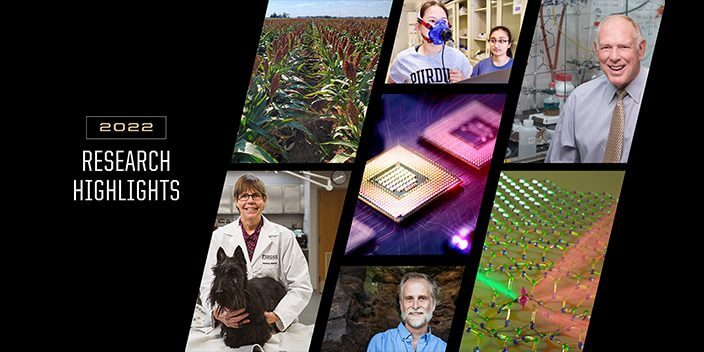2022 IN PURDUE RESEARCH

Combining brilliance with persistence, Purdue University researchers spent 2022 working toward answers to myriad critical questions, taking on challenges facing our national defense, the battle against cancer, and our global food and water supply, among many others. To celebrate the innovative milestones marked during 2022, we offer this small sampling of the year in research.
Successes in the effort to ‘Hammer Down Cancer’
The Purdue Center for Cancer Research marked another impactful year, receiving approval from the Food and Drug Administration for two Purdue-developed cancer therapies. The first, a treatment for prostate cancer, resulted in a 38% reduction in death risk for patients with advanced prostate cancer when combined with the normal standard of care. The second, approved in December, allows the use of Cytalux in lung cancer surgeries. Cytalux, which will be released by On Target Laboratories, is a fluorescent imaging agent that binds to cancer cells, illuminating the cells for surgeons. These are the latest in a series of FDA approvals for Purdue-developed therapies, including two in 2021.
Early cancer detection thanks to man’s best friend
Scottish terriers develop bladder cancer at high rates, and when they do, it’s usually an aggressive form similar to human bladder cancer. Purdue Center for Cancer Research member Deborah Knapp, a Distinguished Professor of Comparative Oncology, developed an early-detection program that has more than doubled the survival rate in dogs and provides information useful in fighting human bladder cancer.
Fossils may be over a million years older than previously believed
A dating method developed by Darryl Granger, professor of earth, atmospheric, and planetary sciences, pushed the age of some South African fossils back more than a million years. This would make them older than the world’s most famous fossil.
New images from space evoke awe, spur inquiry
Danny Milisavljevic, assistant professor of physics and astronomy, leads research that’s putting the world’s most powerful telescope, the James Webb Space Telescope, to use. His research team of 40 scientists from around the nation is studying Cassiopeia A, one of the galaxy’s most puzzling objects.
Research solves scientific conundrum
Graham Cooks, the Henry Bohn Hass Distinguished Professor of Analytical Chemistry, figured out that amino acids spontaneously form peptides in droplets of water. The groundbreaking discovery helps explain the “chemistry behind the origin of life.”
Improving freeze-drying with rocket science
If you think freeze-drying isn’t rocket science, Alina Alexeenko, professor of aeronautics and astronautics and chemical engineering, suggests you think again. She is using computational fluid dynamics and rarefied gas dynamics to explain how to optimize lyophilization — freeze-drying of vaccines and medicines.
Making autonomous vehicles accessible to everyone
If autonomous vehicles go the way of the smartphone and other technologies, they’ll be on the market before they’re made accessible to everyone. Brad Duerstock, a professor of practice in industrial and biomedical engineering, and a wheelchair user, is leading design work on accessible autonomous vehicles that has already won a national first-place award.
You’ll never look at that drive-through cup lid the same way again
Next to the straw on your throw-away cup lid are small, slightly convex circles — little domes. Such invertible domes, when designed on the wings of a drone, are key to new Purdue engineering that enables drones to sense and react to dangerous conditions in microseconds.
Researchers open new frontier in quantum science
In the first work to show optical initialization and coherent control of nuclear spins in two-dimensional materials, researcher Tongcang Li, associate professor of physics and astronomy and electrical and computer engineering, has contributed to a method that has applications in quantum memory, quantum sensing and quantum simulation.
Better forest management though mapping technology
A novel digital mapping method means the difference between mapping a few trees and mapping hundreds of acres at a time quickly and with high accuracy. It also could lead to making digital twins of forests, which could improve management planning in the face of climate change, disease outbreaks and population growth.
Moderate self-control is good. A lot, isn’t.
Psychological sciences researchers found that people who are seen as being high or very high in self-control tend to be viewed as more robotic than others with less self-control. This perception was associated with being viewed by peers or co-workers as being less warm and less sociable than others.
Agricultural breakthrough prevents sorghum from turning poisonous
Millions of people and multitudes of livestock rely on sorghum for sustenance. But the dhurrin it contains can become poisonous hydrogen cyanide in drought or freezing conditions. Mitch Tuinstra, professor of plant breeding and genetics, has developed a dhurrin-free sorghum, solving the problem.
Research gives new meaning to ‘muscle memory’
After finding a positive association between memory and aerobic exercise, Nick Baumgartner, a PhD student in the Department of Health and Kinesiology, is studying whether acute resistance exercise — weightlifting — can enhance memory.
Supporting US defense and advancing our nation’s competitiveness
It was a banner year for national security research at Purdue. In 2022, we announced several first-of-their-kind facilities, including the Hypersonics Advanced Manufacturing Technology Center, a single location at Purdue for industry partners to work on and test hypersonics materials and manufacturing innovations.
We welcomed visits to campus from Secretary of State Antony Blinken and Secretary of Commerce Gina Raimondo and Deputy Defense Secretary Kathleen Hicks – all interested in learning more about our national security research, including our microelectronics expertise, partnerships and leading workforce development training programs. Top microelectronics highlights included the creation of the nation’s first comprehensive Semiconductor Degrees Program and a partnership with Ivy Tech Community College.
In September, SCALE, the Purdue-led premier U.S. program for semiconductor workforce development in the defense sector that is funded by the Department of Defense and managed by NSWC Crane, received a five-year-extension and an $11 million infusion from the DoD.
To cap off the year, we launched the Purdue Institute for National Security to provide strategic access to the university’s capabilities, talent and world-renowned facilities.